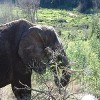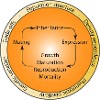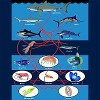Research models, tools, and data
The Trait Ecology and Evolution (Plant) model
Responding to the need among vegetation researchers for a flexible toolbox for investigating the eco-evolutionary dynamics of vegetation, EEP co-developed the Plant model, a comprehensive software package for studying the ecology and evolution of plant communities. More
Statistical analysis for spatial land use data
A prerequisite to the development of realistic models of land use change is the identification of the most important drivers of change. This tool gives an investigator a possibility to summarize the knowledge about interdependent spatial processes in the GIS lattice. Let alone, such a summary can help to draw substantive conclusions about the region under study. More
Reconciling information from alternative sources
Studies of complex systems are non-separable from the analysis of partial and imprecise information received from alternative sources. A system analyst deals with a set of ensemble outcomes which needs to be integrated into one estimate in order to install the ensemble into the modelling chain or provide support for the informed decision making. More
BioGeoChemistry Management Model (BGC-MAN)
Assessing management impacts on the BioGeoChemistry of ecosystems More
Probabilistic approach to address temporal verification of changes in global net carbon emissions under the Kyoto Protocol
This study proposes an approach which permits assessing net emission changes under the Kyoto Protocol, in particular with respect to atmospheric CO2 and CO2 emissions from fossil fuel burning, cement manufacture and gas flaring; whereby emission changes are characterized by uncertainty distributions in terms of verification times (VTs). More
Uncertainty in an Emissions Constrained World: Method Overview and Data Revision
The study by Jonas et al. (2014) “Uncertainty in an Emissions Constrained World” introduces the emissions-temperature-uncertainty (ETU) framework that allows any country to understand its near-term mitigation and adaptation efforts in a globally consistent and long-term context which includes all countries and stipulates global warming to range between 2 and 4 °C. The revised and updated data set supporting the ETU framework is the basis for analyzing greenhouse gas emission targets scaled from global to regional (here EU 27) to national levels (here Austria). More
Stochastic Quasigradient (SQG) methods: Applications
Stochastic Quasi-Gradient (SQG) methods have been developed for solving general optimization problems without exact calculation of objective function and constraints (let alone of their derivatives). SQG methods enable a sequential revision of approximate solutions towards the optimal using newly acquired information on the system, obtained via either direct on-line observations or(and) simulations. More
Framework for Eco-Genetic Modeling
The framework for eco-genetic modeling offers flexible tools for exploring the course and rates of multi-trait life-history evolution in natural populations. More
R Library for Estimating Fisheries-Induced Selection Pressures
The Working Group on Fisheries-Induced Evolution (WGEVO) of the International Council for the Exploration of the Sea (ICES) has developed a general framework for investigating eco-evolutionary changes in fish stocks and their utilities in terms of ecosystem services and for assessing the management implications of fisheries-induced evolution through Evolutionary Impact Assessments (EvoIAs). More
Large Community-Evolution Models (LCEMs)
The complexity and dynamical nature of community interactions make modelling a useful tool for understanding how biodiversity patterns in communities develop over time and how they respond to external perturbations. More
Tools for Assessing Incentive Mechanisms
Ensuring that common goods and open-access resources—everything from clean air and the global climate to the internet and civil security—are equitably and fairly available to everyone requires incentive mechanisms. More
Disease-Eradication Model
Despite modern medical interventions, infectious diseases continue to generate huge socio-economic losses. More
Database of Exploited Fish Stocks
The Working Group on Fisheries-Induced Evolution (WGEVO) of the International Council for the Exploration of the Sea (ICES) has developed a general framework for investigating eco-evolutionary changes in fish stocks and their utilities in terms of ecosystem services and for assessing the management implications of fisheries-induced evolution through Evolutionary Impact Assessments (EvoIAs). More
Database of Quantified Food Webs
Biodiversity patterns in natural ecosystems are dynamically sustained by food webs, describing the feeding relations among all ecosystem compartments, including the involved animal and plants. More
Consistent algorithm for linking distributed models under asymmetric information
The linkage algorithms solve the problem of linking models, e.g. sectorial and/or regional, into an inter-sectorial inter-regional integrated model. Linkage enables to avoid “hard linking” of models in a single code, which saves the programming time and enables parallel distributed computations of individual models instead of a large scale integrated model. Models linkage preserves the structure of the original models taking into account critically important details, which are usually missing in aggregate models More
FABLE Scenathon
Scenathons: Interactive Scenario and Development Pathway Planning More

PUBLICATIONS



















